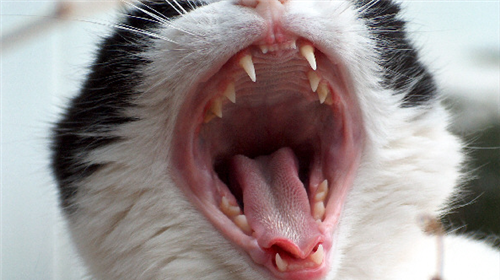Chinchilla (details)
Siamese cats are the representative of Thai pet cats. Their soft body and smart and understanding personality are their advantages. Because of this, mainlanders also like this breed of cats from foreign countries, but many Chinese keep them.
1. Common symptoms of oral inflammation in Siamese cats
1. Salivation, bad breath, pain in chewing and swallowing, foaming in the mouth, salivation, weight loss, depression.
2. Gum swelling, hyperplasia, oral mucosa, pharynx or tongue ulceration.
3. Missing teeth, reduced number of teeth, loose teeth.
4. Oral mucosal congestion, erythema, pharyngeal erythema, redness, oral mucosal ulcers, blisters, plaques.
5. Swelling, lumps, pharyngeal ulcers, blisters, erosions, papules, sores of the throat, pharynx, and trachea.
6. Tongue sticking out, sticking out tongue, tongue ulcers, blisters, erosions, sores, vesicles, swelling of the mouth of the tongue, lumps.

healthy cat teeth
2. Causes of oral inflammation in Siamese cats
1. Food hygiene
Diet, oral morphology, oral hygiene care, and oral inflammation in most animals are associated with calculus and teeth.
2. Viruses
Systemic infectious diseases, such as infection with feline HIV (FIV), feline leukemia virus (FeLV), herpes virus, calicivirus, and feline distemper virus.
3. Cat Diabetes
In addition, when diabetes, renal failure, and systemic lupus erythematosus occur, oral ulcers can also occur; there is also a cat eosinophilic granuloma that can also cause oral mucosal damage.
4. Fungal infection
Certain fungal infections can also cause lesions of the oral mucosa.
5. FIV infection in cats
About 50% to 80% of cats infected with FIV have chronic gingivitis alone or with other diseases.
III. Diagnosis of Oral Inflammation in Siamese Cats
1. Feline herpesvirus: and calicivirus are the main causes of respiratory tract infection in cats, and accompanied by ulcerative stomatitis, painful lesions on the tongue and soft palate; calicivirus infection
2. Feline HIV: Chronic gingivitis and stomatitis are usually seen during infection; ulcers can occur on the tongue, gums, mucous membranes, and behind the molars; mainly caused by immunosuppression; the ulcers are very painful
3. Feline distemper virus: Mainly manifested as severe gastrointestinal symptoms; oral lesions included: necrotizing gingivitis, severe ulcerative glossitis, and soft palate ulcers.
periodontal disease cat
IV. Treatment of chronic gingivitis in Siamese cats
Conservative therapy: Symptomatic treatment is difficult to cure.
Commonly used conservative therapy drugs are as follows:
1. Antibiotics: Metronidazole, Sono, Doxycycline, Clindamycin, Baili, etc., mainly kill oral bacteria and control secondary bacterial infection.
2. Glucocorticoids: prednisolone, dexamethasone - reduce the immune response, reduce the further damage caused by the body's immune response, and play the purpose of anti-inflammatory and swelling.
3. Megestrol acetate: (mainly used for the treatment of advanced breast cancer and advanced endometrial cancer, and also has a certain effect on kidney cancer, prostate cancer and ovarian cancer. It can also improve appetite and cachexia in patients with advanced tumors.) Here
4. Levamisole: It was originally a drug to drive roundworms, and its side effect is a very good immune enhancer.
5. Multivitamins: Nature is an indispensable nutrient for the body.
6. Thyroxine: Promote metabolism and enhance physical fitness.
7. Anti-inflammatory drugs: reduce inflammation, reduce pain and redness.
8. Cyclosporine: an immunosuppressant that reduces the immune response.
9. Analgesic drugs: Encourage animals to eat actively after pain relief.
Surgical therapy: A number of foreign literatures reported that 75% of the patients could be cured after all molars and premolars were removed.
Editor's Note: Parents should not give the above drugs to Siamese cats without the permission of the veterinarian, because the doses of the drugs used by cats are calculated according to the condition and body weight. If unprofessional parents control the dose
